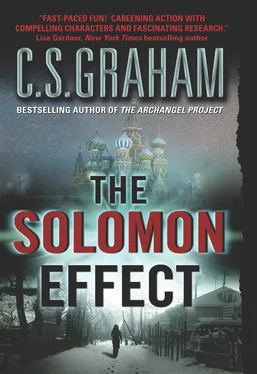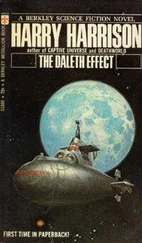“You’ve got a bunch of good people here, General,” said the Secretary, clasping Boyd’s hand. “Keep up the great work.”
“Thank you, Mr. Secretary.”
The Secretary’s minder was already whispering in his ear, whisking him off toward Washington. Boyd worked his way down the line of proud young SEALS, shaking hands, pressing shoulders, saying, “We’re proud of you. You did a great job.” But all the while, his gaze was scanning the excited crowd for his own aide, Captain Syd Phillips. Boyd had a flight to Washington planned tonight himself, with a brief stop first in Miami.
For more than thirty years Gerald Boyd had played by the Government’s rules. Time after time he’d had to watch while the girly men in Washington, D.C., let down the country and let down its troops because they didn’t have the stomach to do what needed to be done to protect America. But Boyd was about to change all that. If he’d learned one thing from a lifetime of leading black operations, it was that a few dedicated men, working in the shadows, could literally alter the future of the world.
He was turning away from having his picture taken with the pretty, fair-haired wife of one of the SEALS when his aide, Captain Phillips, appeared and leaned in close to say, “Your plane is ready whenever you are, General.”
“Good. I think at this point we can safely leave things to the unit commander.”
“Yes, sir.” Captain Phillips gave a quick glance around and cleared his throat. “Our friend at Langley just called.”
“And?”
“Your activity in the Baltic has attracted attention. They’re sending a man to Kaliningrad. He leaves tonight, traveling through Berlin.”
Boyd pressed his lips into a thin, flat line. “Get the details to Rodriguez. I want someone in Berlin to stop this individual. And tell Rodriguez to have someone at the airport in Kaliningrad, too, just in case.”
“Both?”
Boyd kept his voice low. “This thing is too close to going down. We can’t afford any more mistakes. If we miss this guy in Germany, we nail him in Russia. Got it?”
“Yes, sir.”
New Orleans: Saturday 24 October 7:30 P.M. local time
Tobie was at home, curled up on the sofa with her laptop and an orange alley cat named Beauregard when the call came through from McClintock.
“It’s a go, Tobie. The DCI was dead set against it, but you’ve got Beckham solidly behind you.”
“Yes!” She leaped up, unsettling the disgruntled cat and nearly sending her Apple flying.
At the other end of the line, the Colonel sighed. “I just hope I’m not making a mistake on this.”
She sank back down on the sofa, her hand tightening around the phone. “I won’t let you down, sir.”
“That’s not what I’m worried about, Tobie. How much do you know about Kaliningrad?”
“Not much. I was just Googling it.”
McClintock huffed a soft laugh. “The province-Kaliningrad Oblast-used to be part of Germany. East Prussia. The Russians took it over at the end of World War II and split it with Poland. Just to confuse things, they renamed the main city Kaliningrad, too.”
“What did it used to be called?”
“Königsberg.”
“Königsberg? As in, Immanuel Kant?”
“That’s right. Although there’s not much of the old German city left anymore. Back in the days of the Cold War, the province was considered very important, militarily. But it’s been hit pretty hard by the breakup of the Soviet Union.”
“Why’s that?”
“Because now that Estonia, Latvia, and Lithuania are independent, Kaliningrad is an exclave, cut off from the rest of Russia. The economy is worse than dead. This place doesn’t have much in common with the rest of the New Russia. Life there basically hasn’t changed in the last fifty years.”
It was a description that fit in well with what she’d seen in her viewing. She said, “When do I leave, sir?”
“First thing in the morning, flying through Copenhagen. We’d like to have gotten you out of here tonight, but you know what connections are like out of New Orleans since Katrina. You won’t actually be landing in Russia until Monday morning.”
“When’s the CIA guy getting there?”
“Tomorrow afternoon.”
“That’s not good. Any idea yet who they’re sending?”
“Yeah. Jax Alexander.”
“Jax? But…Jax doesn’t believe in remote viewing.”
“He saw it work last summer, right here in New Orleans.”
“And he still thinks it’s a bunch of New Age nonsense.”
“Everyone at the CIA thinks it’s a bunch of New Age nonsense. You knew when you asked for this that it wasn’t going to be easy.”
“You won’t be sorry, Colonel.”
McClintock made an incoherent noise. “Just…be careful, Tobie.”
Later that evening, after she’d packed a bag and talked to Ambrose next door about taking care of Beauregard, she stood in her darkened living room and gazed out at the ancient live oaks casting their gnarled shadows across the narrow moonlit street.
She could feel the tendrils of anxiety coiling tightly within her. She believed in remote viewing, and she knew what she’d seen. But she also knew that her viewings weren’t always accurate. What if this was one of those misses? Or what if the viewing was accurate, but they’d misinterpreted what she’d seen? Looking at the full moon riding above the branches of the old oaks, she imagined she could already hear the clock ticking toward Halloween.
She felt Beauregard rub against her leg. Reaching down, she scooped the cat up into her arms. “Wish me luck, Beau,” she whispered, and held him close.
Kaliningrad, Russia: Sunday 25 October
3:45 A.M. local time
The Major pulled into the darkened driveway in the leafy suburb of Mendeleevo and cut the engine. Once, this large stuccoed house with its expansive lawn and carefully tended garden had been the home of a German banker, or maybe an industrialist. Now it belonged to some Russian mafioso who rented it to those seeking a quiet, out-of-the-way property in a district where neighbors were hidden behind high walls and no one asked any questions.
A dog barked somewhere in the distance and was quickly hushed. The Major let his gaze rove over the building and its perimeter. Satisfied, he opened the door and stepped out into the chill of the Baltic night.
His name was Carlos Rodriguez. At forty-two, he was a leanly muscled professional soldier with olive skin and short-cropped dark hair. He wore the simple cotton trousers and closely knit sweater of a local, but he was not a local. The house served as headquarters for the team he’d assembled: two Americans, a Brit, four Russians, and the Chechen, Borz Zakaev. He needed the locals because they knew the geography and the people. But Rodriguez didn’t like Russians, and he didn’t trust them. He was glad to have Borz and the Americans there to watch his back.
It was the damned Russians who’d assured him the salvage ship captain, Baklanov, was reliable. Not honest-no honest man would have done business with them. But reliable. Instead, the man turned out to be an idiot. Only an idiot would try to cheat Carlos Rodriguez.
“What’s the status on the U-boat?” he asked, letting himself in the house’s side door.
The door opened into an enormous kitchen recently renovated with rich cherry cabinets and marble countertops and stainless steel industrial appliances. They’d set up their communications equipment in what was meant to be a nearby maid’s room, a simple chamber with a single bed, a chair, and a low dresser.
The house was quiet, the rest of the men asleep. But Ben Salinger, the towheaded kid from Nebraska who served as Rodriguez’s communications expert, looked up from his laptop, his eyes glazed with amphetamine-revved exhaustion. “We just got a report from Kirkpatrick. The sub still hasn’t blown.”
Читать дальше











